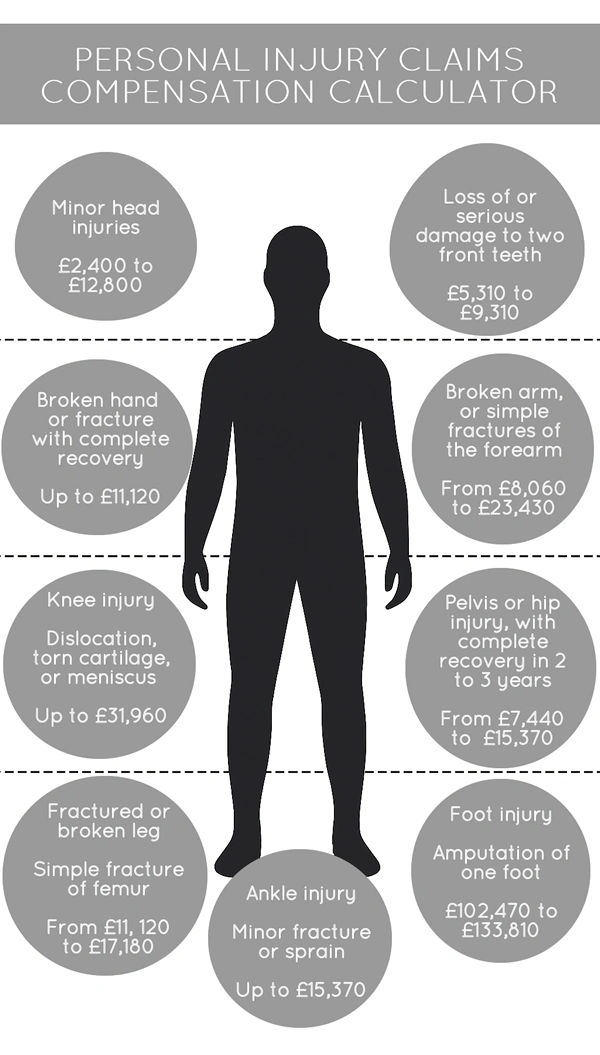
Discover how much compensation you may be entitled to in just minutes. We will assess your case after a consultation and calculate the estimated pay-out you can receive.

How is my personal injury compensation claim calculated?
When working out your personal injury compensation, your solicitor will look at how serious your injury is and the impact it has on your everyday life. Legally, your total compensation is made up of two parts: ‘general damages’ and ‘special damages’.
General damages
General damages are awarded to cover the pain, suffering, and loss of enjoyment of life caused by your injury.
To determine the amount you might receive, your solicitor will use the Judicial College Guidelines, a key reference used by legal experts all around the UK to value personal injury claims, they offer guidance on compensation ranges for both physical and psychological injuries. The figures provided in the guidelines are used by solicitors and courts as a “foundation.” They can then be adjusted based on the nature and seriousness of the injury suffered.
Special damages
Any financial losses or direct expenses that result from your injury are covered by special damages. You could claim for things like:
- Any loss of earnings (This can include future income, overtime, and pension contributions)
- Medical expenses
- Physiotherapy sessions
- Travel costs related to your injury
- Care and support costs
- Damage to personal belongings or property
- Expenses for the need to adapt your vehicle or home
Compensation payouts and settlements
When you bring a personal injury claim, the outcome is usually a settlement or payout.
- Settlements:Most claims are resolved through settlements, this means your solicitor and the other side agree on a fair amount without taking things to court. Settlements are often much quicker and are less stressful, they provide certainty over the amount you’ll receive.
- Payouts:If a claim goes to court, a judge will decided on the final payout you receive. Although this can sometimes lead to higher awards, it often takes much longer to conclude.
When you are working through your claim your solicitor will guide you on whether it’s better to accept an early settlement or if you should continue negotiations to secure the maximum payout possible for your suffering.
The below data is samples to show just some of the compensation figures available. To determine your exact calculation, please get in touch so we can understand and examine your individual case specifically.
Head & Neck Injuries
| Injury Type | Compensation Range |
|---|---|
| Severe brain injury with permanent disability | £200,000 – £300,000+ |
| Moderate brain injury with moderate disability | £85,000 – £200,000 |
| Minor brain injury with no long-term effects | £1,000 – £2,500 |
| Neck injury causing permanent disability | £36,000 – £130,000 |
Fractured or Broken Bones
| Injury Type | Compensation Range |
|---|---|
| Severe fracture with permanent disability | £36,000 – £120,000 |
| Moderate fracture with some residual disability | £15,000 – £36,000 |
| Minor fracture with no long-term effects | £1,000 – £5,000 |
Lower Limb Injuries
| Injury Type | Compensation Range |
|---|---|
| Severe leg injury with permanent disability | £36,000 – £100,000 |
| Moderate leg injury with some residual disability | £15,000 – £36,000 |
| Minor leg injury with no long-term effects | £1,000 – £5,000 |
Scar & Laceration Injuries
| Injury Type | Compensation Range |
|---|---|
| Severe scarring with significant psychological impact | £10,000 – £50,000 |
| Moderate scarring with some psychological impact | £3,000 – £10,000 |
| Minor scarring with no psychological impact | £1,000 – £3,000 |
Psychological Injuries
| Injury Type | Compensation Range |
|---|---|
| Severe psychological injury with permanent disability | £50,000 – £100,000 |
| Moderate psychological injury with some residual effects | £15,000 – £50,000 |
| Minor psychological injury with no long-term effects | £1,000 – £5,000 |
Tendon & Ligament Injuries
| Injury Type | Compensation Range |
|---|---|
| Severe tendon/ligament injury with permanent disability | £15,000 – £60,000 |
| Moderate tendon/ligament injury with some residual effects | £5,000 – £15,000 |
| Minor tendon/ligament injury with no long-term effects | £1,000 – £5,000 |
Chronic Pain Injuries
| Injury Type | Compensation Range |
|---|---|
| Severe chronic pain with permanent disability | £20,000 – £80,000 |
| Moderate chronic pain with some residual effects | £5,000 – £20,000 |
| Mild chronic pain with no long-term effects | £1,000 – £5,000 |
FAQ’S
Is it possible for extra payments to be added to my compensation?
After combining your special and general damages, the overall amount could be adjusted based on certain factors.
| Extra Payments | Who adds this? |
|---|---|
| Plus 10% rule Should you enter into a no win, no fee agreement your compensation will include a 10% increase. This is designed to help balance out the deduction made for your solicitor’s success fee. | Official Guidelines |
| Increase for multiple injuries If you’ve suffered more than one injury, the general damages compensation you receive will be adjusted to reflect the combined impact. | Official Guidelines/solicitor negotiation/ court decision |
Will there be any deductions from my compensation?
Your final compensation amount may be adjusted in the following ways depending on how your accident happened and the specific No Win, No Fee agreement you make with us:
| Deductions | Deducted by |
|---|---|
| Shared Responsibility (Split Liability) Even if you are partially at fault for the accident, you may qualify for compensation, but the payout is likely to be less. Your solicitor will work with the other party’s legal team to agree on how responsibility is divided, this is usually worked out as a percentage. For instance, if you’re found to be 50% at fault, your compensation would be reduced by half. | The Official Guidelines |
| Success fee With a no win, no fee compensation claim, you won’t pay your solicitor if the case is unsuccessful. However, if you win, they’ll take what is known as a “success fee,” which can be up to 25% of the compensation you receive. For example, if you’re awarded £15,000, up to £3,750 may go to your solicitor. The exact fee will be agreed in advance before your claim begins. | Terms of your chosen solicitor’s no win, no fee agreement |
| ATE Insurance After the event insurance is a key component of most no win, no fee agreements. It protects you from having to pay the defendant’s legal fees if your claim is unsuccessful. You would only pay the ATE insurance should you win your case, and this cost is usually taken from the compensation that you are awarded. | Terms of your chosen solicitor’s no win, no fee agreement |
| No win, no fee terms A number of No Win, No Fee agreements will only cover the solicitor’s fees and exclude other expenses such as barrister fees. Additionally, certain agreements may include cancellation charges. | Terms of your chosen solicitor’s no win, no fee agreement |
| Tax Compensation for personal injuries is generally tax-free. However, any interest included in your compensation may be subject to tax. The interest is computed from the date of your injury until your claim is resolved. | HMRC |
| Benefits While it won’t reduce your compensation, any future benefits subject to means testing that you could receive (such as Universal Credit) could be impacted. | Government means-tested assessment |
Does the reason for my injury affect how my compensation claim is calculated?
Typically, the reason for your injury doesn’t influence the compensation amount, but in some cases, the circumstances surrounding the injury may affect how much you receive:
- Road traffic accidents (RTA’s): We take into account special damages such as rental car expenses or vehicle repair costs. It’s also common for compensation to be reduced due to shared fault in RTA’s.
- Uninsured drivers or those that can’t be found: If the driver responsible for your injury cannot be found, identified or lacks insurance, compensation payouts may be lower. These cases are usually managed by the Motor Insurers Bureau, which applies a different compensation tariff.
- Workplace injuries: We factor in special damages like any loss of earnings you may have suffered. When it comes to work-related injuries, compensation is unlikely to be decreased even if you share some blame, as a result of vicarious liability.
- Injuries in public places: Compensation for injuries sustained in public areas is calculated using the Judicial Guidelines. However, if your injury results from a criminal assault, compensation will be awarded by the Criminal Injuries Compensation Authority (CICA), which uses its own specific tariff for assessing damages.
Are there other factors that could influence my compensation?
The majority of personal injury claims are resolved out of court through discussions between lawyers. These talks are vital in achieving the best compensation for you.
The opposing side’s solicitors often employ various strategies to reduce the amount they pay, including making early low offers, direct insurer proposals, or pre-medical settlements.
What’s the average general damages compensation for an injury claim?
Although average compensation figures can give a general idea, they don’t always tell the whole story. The actual amount you receive will depend on your unique situation.
Your compensation is based on how your injuries have affected your life, your earning capacity, and the real costs and losses you have faced due to the injury.
How long does it take to receive my settlement or payout?
The time it takes to receive your settlement or payout depends on the complexity of your case. Straightforward claims may be settled in a few months, while more serious or disputed cases can take longer. Most settlements are paid within 14–28 days, though timelines can vary.
What’s the difference between a payout and a settlement?
A settlement is when both sides agree on an amount of compensation without going to court.
A payout is the actual money you receive, whether from a settlement or a court award. Every settlement leads to a payout, but not every payout comes from a settlement.
Maximising your settlement or payout
Every personal injury claim is unique, and so is every settlement or payout. The best way to make sure you receive the maximum amount is by working with an experienced solicitor who can negotiate settlements or secure payouts in court.
If you’d like advice on your potential settlement or payout, get in touch with our team today.


